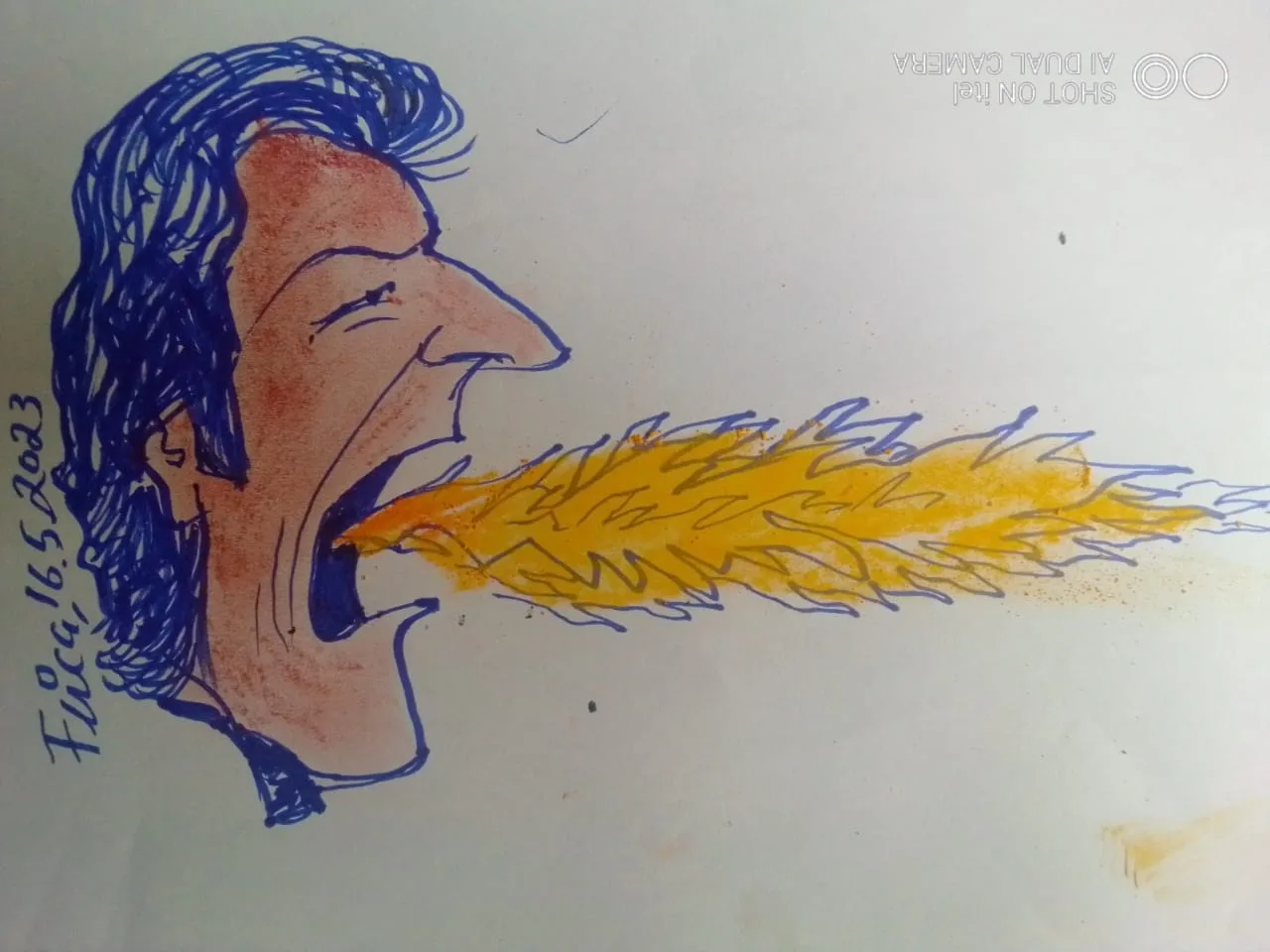By Shazia Anwer Cheema
When I started calling PTI a cult, I received a terrible response and even threats because at that time Imran Khan was sitting on the PM seat and everybody in Pakistan was on “One Page”.
However, I continued to write because I am a teacher by profession and I could not sit idle, while I was witnessing my youth that is the future of my country was in danger. Let us review what we have done with our youth.
Since I have been saying that Imran Khan has a cult following he himself has extremist/ twisted views over the interpretation of religion, political system, and lack of faith in a democratic dispensation. He is indoctrinating that anything without Imran Khan is anti-religious, anti-social, and unethical that is why Imran Khan’s inflicting damage on youth is multi-layered— the faith (God forbids me some of his followers are tagging him someone who is above the normal human being) – political discourse of establishing Utopian State and dismantling of an existing State—Pakistan for constructing a New Pakistan.

Every aspect of this perception has been indoctrinated. Our youth is not responsible for what we are facing today rather we all as a nation are responsible because the majority of us kept quiet when all this was happening and innocent youth was targeted. Now this youth has blurred ideas about everything including social norms and political norms (the state has failed to deliver due to the existing parliamentarian system and a Khamenei-like revolution or Afghan Taliban-like system can bail out Pakistan). His slow indoctrination has worked well and now our youth wants a religious extremist administration system like those of Iran and Afghanistan because these systems are being induced in the general public by Imran Khan because of his dogmatic mindset.
Related Story: Is there any difference between TTP and PTI?
His own kind of interpretation of religion, the justice system, governance, and politics the way it suits him does not cover any existing workable political system so he is offering just possibilities and experimentations— same experimentation he had been doing with the country for 42 months rule. Can we hand over our country to him again for his elusive experimentation which in fact he has no model of governance of the modern world that could be shared and offered to his followers?
PTI has raised a strong virtual presence and its followers now live in the virtual world and are now almost disconnected from the real world. Virtual world formation suits PTI because anonymity and accessibility of social media have provided a free ground for hate speech and malignant propaganda.
The extreme beneficiaries of this situation are those who have an un-substantiated narrative such as what kind of governance model Imran Khan has to offer to the country if he again comes into power. Parliamentarian? Presidential? Sharia? mixed of everything? then what kind of this mixture would be? There are a dozen questions but instead of offering a model, he says first we must destroy the existing model.
This point of destruction of the existing model and offering the Utopian model always suits cult formation and almost all cults that became infamous were against existing social, religious, economic, and governance models but they always offered confused, full of fallacy, contradictory models to their followers. Before trying to explain how Imran Khan operates, let us have a look at how the cult operates and its formation through academic research.
Dr. Linda Ellis in her academic paper, titled “Understanding Political Cults and Political Religion”, writes that a cult is a system of devotion directed toward a particular figure in religion, politics, the military, or even in business. Religious and political cults are certainly not new — they appeared in ancient history and will continue to develop in the future.
Three international researchers on this subject are important to review for understanding the history, psychology, and social structure of political cults Dennis Tourish, Timothy Andrew Wohlforth, and Emilio Gentile.
Dennis Tourish is currently Professor of Leadership and Organization Studies at Sussex University and he was a member of the left-wing political cult in Ireland and his work is on the recruitment and indoctrination methods used by cults and the psychology of their members. His terminology of “cultic mindset” almost covers all aspects that we can see in followers of Imran Khan. He says that cults are highly effective at censoring information, and many cult members disregard opinions that are not in line with their leadership. This echo chamber leads to excessive distancing between family members and other outside influences. A major strategy used by cults to indoctrinate members is social isolation and this is done by PTI to keep its followers always busy on social media platforms.
Timothy Andrew Wohlforth believes that the most disturbing trend is the appearance of an absolutist belief system in cult followers that is concerned with stereotyping, prejudice formation, and demonization of all other people around them even their families.
Emilio Gentile (Professor in the Faculty of Political Science, University of La Sapienza, Rome) conducts a parallel line of research on the ideology and culture of totalitarian movements. Gentile has written extensively on political religion or the “sacralization” of politics-the formation of a religious dimension in politics that is separate from the traditional religions. He world-renowned historian of Fascism and has clearly outlined the warning signs of cultic behavior in the rise of autocratic states, including:
- the concentration of power in a single party and in a charismatic leader or politician
- demagoguery through constant propaganda, the mobilization of enthusiasm, and the celebration of the cult of the party and the leader
- the introduction of rituals, festivals, or rallies to transform crowds into the masses of the political cult
- discrimination against outsiders or undesirables because of their ideas, social conditions, or ethnic background
Emilio Gentile worked extensively on how totalitarian regimes in the 20th century arose from the demagoguery of charismatic politicians. Typical tactics include the use of parades, grand events, and rallies to mobilize and transform enthusiastic crowds and to celebrate the political cult, the party, and the leader. These political cults provide easy answers to complex problems, demonstrate a lack of tolerance, and always find someone to blame to the point that, given the right conditions, a democratic society can give way to an authoritarian form of government.
As I mentioned in my articles that cult formation is thousands of years old phenomenon so I would like to cite what lessons history has taught us from a Political Cult in Ancient Rome.
As the Roman Empire spread eastward to Greece, Turkey, and the Middle East, new ideas filtered into Roman life, such as religious cults inspired by deities like Isis of Egypt, Dionysus of Greece, and Mithras of Persia. Honoring a human being (like a king, emperor, or hero) as a god was another concept that originated from the eastern part of the Roman Empire. However, creating a religious cult around an earthly leader was actually a repugnant idea to Roman politicians during the Republic of Rome. Julius Caesar’s power design was based on religious worship, hero worship, and the idea that “nobody is available to rule as intelligent as Caesar, as brave as Caesar, as handsome as Caesar, as sensual as Caesar, and as religious as Caesar. So he raised a brigade of priests around him and they gave him religious honors as some top clergymen raised Imran Khan as the most honest and “must for Pakistan” etc.
Historians believe that the emergence of the Caesar Cult was the result of a “social vacuum” that took place due to a power struggle between two Roman generals, Marius and Sulla. In Pakistan that was done due to constant blame games and power struggle between PMLN and PPP. Roman infighting and growing polarization among the senators (politicians) divided the society into two ideological factions (but not organized political parties in today’s sense): The Optimates (best ones) vs. the Populares (favoring the people) and here in Pakistan Imran emerged as “Optimate”.
Dr. Lionel Obadia, who is a Professor in Anthropology at the University of Lyon, France in his academic paper titled “When Virtuality Shapes Social Reality. Fake Cults and the Church of the Flying Spaghetti Monster” writes that the creation of online religions (religions mainly existing in the virtual world) gave birth to so-called “parody” or fake cults. Online religions and especially “fake cults” are most of the times used by scholars as examples of a shift from “reality” to “virtuality” caused by the Internet.
Referring to works of scholars such as Helland, Dawson, and Stolow, he analyzed the complex relations between faith and the Internet and research indicates that the creation of a new Faith has become easy and simple through creating virtual space and unexpected forms of beliefs and cults are created, within the vast spectrum of virtual religions. In this scenario we can wait for the emergence of the “Imran Khan Faith”; a leap from the “Imran Khan Cult” sooner or later.
 Note: Writer Shazia Anwer Cheema is an author, columnist, and foreign affairs expert who writes for national and international media. She is a doctoral student and researcher in semiotics and philosophy of communication at Charles University in Prague. She can be reached at her: Twitter @ShaziaAnwerCh Email: shaziaanwer@yahoo.com
Note: Writer Shazia Anwer Cheema is an author, columnist, and foreign affairs expert who writes for national and international media. She is a doctoral student and researcher in semiotics and philosophy of communication at Charles University in Prague. She can be reached at her: Twitter @ShaziaAnwerCh Email: shaziaanwer@yahoo.com
Disclaimer:
The views and opinions expressed in this article/Opinion/Comment are those of the author and do not necessarily reflect the official policy or position of the DND Thought Center and Dispatch News Desk (DND). Assumptions made within the analysis are not reflective of the position of the DND Thought Center and Dispatch News Desk News Agency.
